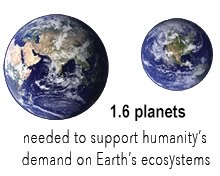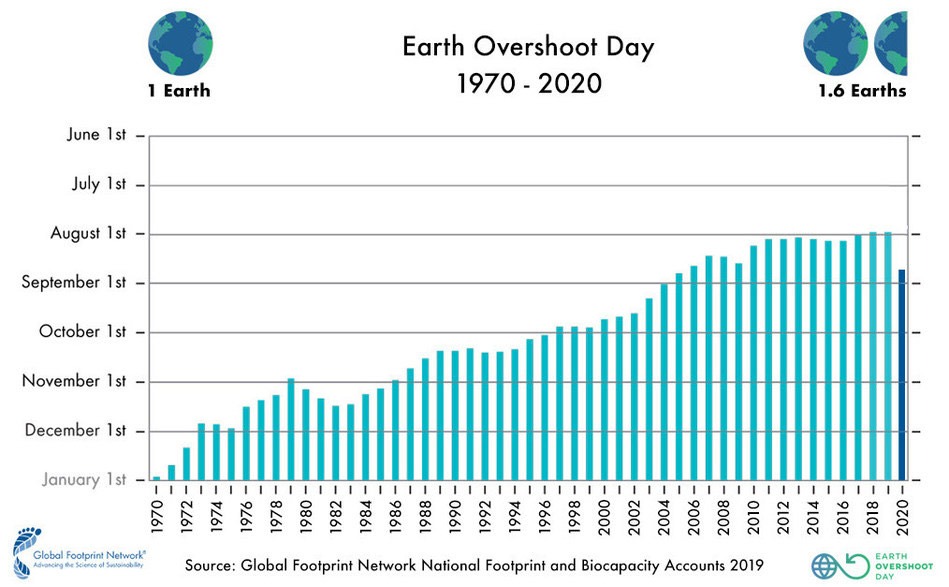“ Our planet has a budget, but this budget isn’t about money. It’s about resources.”
Today, I want to talk to you about budgets. Don’t worry, it’s not as boring as you think. In fact, this is going to be thrilling. I think we are all familiar with that “oh crap, my Netflix autopay is scheduled for tomorrow but I bought too many indoor plants and my paycheck isn’t hitting until next week” feeling. When we see our bank account overdrawn we experience that ever present, low frequency anxiety that us millennials sometimes mistake for the feeling of just being alive, and we think, “It’s fine. It’ll be fine. Oh shit, it might NOT be fine. Am I dying? Why are my palms so sweaty?!” To avoid feeling alive, I mean, anxious (sorry, I millennial-ed) we budget our money and live as responsibly as possible.
This blog isn’t about personal finances. If it was, I wouldn’t be writing it. I don’t think I would even read it. Ha! I definitely wouldn’t read it. This blog is about the environment so I have to pause for a second and come clean to you all. When I said thrilling, I actually meant TERRIFYING. Sorry.
Our planet has a budget but this budget isn’t about money. It’s about resources. Earth can only produce a certain amount of resources every year and every year we use it all up. The day that we use up the year’s worth of resources is called Earth Overshoot Day. This year it falls on August 22.
Visit https://www.overshootday.org/ for more information. All the science-y bits about how that date is calculated is explained there way better than I could explain it.

But guys, what happens on August 23? When I overdraw my account, I let all my friends know I have grounded myself and can’t go out and then eat the weird food I’ve accumulated in the back of my freezer until I get more money. Humanity doesn’t do that.
We just keep using resources like nothing is wrong and we borrow from our future. Well, our kids’ future. Our precious babies and their precious babies and their precious babies will pay our debts for us. They will have to deal with our heaps of disgusting garbage. They will have to fish plastic out of the ocean. They will have to deal with the raging wildfires. Oh, and remember those miserable months of quarantine? They will have to do that more and more as new diseases ravage the world. Don’t kid yourself. This is the future we have created.
Throwing up yet? I told you this would be thrilling terrifying.
Earth Overshoot Day usually falls in late July or very early August if I recall correctly. Turns out, not driving, not shopping, working from home, and baking all that sourdough bread actually pushed Earth Overshoot Day back a bit. Well, not the sourdough. Scratch that. Delicious, but not impactful. Anyway, was it worth the hundreds of thousands who passed away? NO WAY. But we can dramatically impact the environment for the better by changing our behavior? Turns out, all those climate scientists who have been telling us that we can dramatically impact the environment for the better by changing our behavior were right all along. Who would’ve thought that scientists who study this kind of thing would actually be right? Wild.

Okay, stop throwing up for a second because we need to talk about what we can do. Disclaimer: I am not an expert. Far from it. I’m just a 32 year old lady who likes to sew, garden, and watch YouTube videos about sewing and gardening. I’m a mom, a wife, a daughter, sister, friend, and turns out, an excellent bread baker. In my free time I enjoy not taking long walks and just lying down, celebrating my left handedness, and smashing the patriarchy. In terms of the environment, I can only tell you what I do and help you figure out how to live more sustainably. Since we’re all in different places in our sustainability journeys, I’ll start by telling you a few things I did when starting out. This is not a step by step guide. This is just me being transparent about my journey and I’m hoping this gives you the push to get started if you haven’t already.
- I swapped out one single use disposable item for a sturdy reusable item. Like many others, I started with straws. I don’t really even use straws but I saw that picture of the sea turtle with the straw and bought myself some reusable metal straws. I still have them and keep a few in my car. Looking back, I should have just stopped using plastic straws. Turns out being sustainable does not mean going out and buying a bunch of stuff. I know this now. However, if you want to swap out a single use disposable item that NEEDS to be replaced, check out https://earthhero.com/. They only sell stuff that is eco-friendly and they do a great job at vetting the products they sell. You can filter products for things like “plastic free packaging” and “upcycled content” and much more.
- I started composting. We throw away a lot of food. The best thing to do is just buy what you need. Next best is to figure out a game plan for stuff you bought that you won’t be able to eat. Freeze it for later or give it away. Here in Putnam we have an awesome organization called Second Chance Foods. Check them out here https://secondchancefoods.org/. Regarding composting, I use the “throw it in my compost and pray” method of composting so check out the Cornell Cooperative Extension’s Compost Resources at http://putnam.cce.cornell.edu/gardening/compost-resources.
- I joined Sustainable Putnam. Well, this happened years into my sustainability journey but it’s an important step that can happen at any point in your journey so it belongs on this list. Not only do I have resources at my fingertips with SusPut but I found an amazing group of like minded people who make this terror much less terrifying. I experience environmental panic quite often but knowing that I am involved with a group of people who are just as concerned and active as I am makes me feel so much better. Join us at http://emn.ctp.mybluehost.me/. We’re all in this together and would love to have you.
Well, that was a roller coaster, huh? As this ride comes to a stop, I ask you to join me in reimaging our future. One where we aren’t constantly at war with a climate crisis. Let’s create a world where treading lightly on the earth is normalized. I know that taking the next step toward a more sustainable life can be puzzling and overwhelming so let’s figure it out together. You are not alone in this. I am not alone in this. We are not alone in this. Until next time, be well everyone and continue wearing those masks!
Kei Reing lives in Mahopac with her husband, two young children, and dog. She enjoys crafting, yoga, and indoor gardening. Kei is a certified TRUE Zero Waste Advisor and strives to apply Zero Waste principles to her household.
